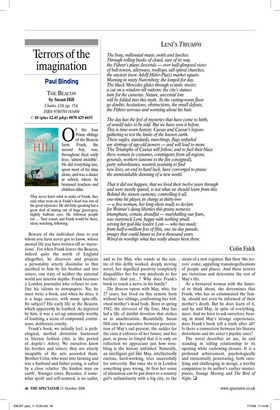L ENi ’ S T RIUMPH The boxy, millennial music swirls and lurches. Through
rolling banks of cloud, sure of its way, the Führer’s plane descends — over half-glimpsed views of bell-towers, alleyways, rooftops, tall-spired churches, the ancient (now Adolf-Hitler-Platz) market square. Morning in misty Nuremberg: the longed-for day. The black Mercedes glides through ecstatic streets; a cat on a window-sill wakens; the city’s statues turn for the cameras. Nature, ancestral lore will be folded into this myth. To the cutting-room floor go doubts, hesitations, obstructions, the small defeats, the Führer nervous and worrying about his hair.
The day has the feel of mysteries that have come to birth, of untold tales to be told. But we have seen it before. This is time-worn history: Caesar and Caesar’s legions gathering to test the limits of the known earth.
These eagles, standards, marchings, flags unfurled are stirrings of age-old powers — and will lead to more. The Triumphs of Caesar will follow; and to fuel their blaze these women in costumes, contingents from all regions, generals, workers (unions to the fire consigned), party subordinates, wastrels yearning to find new lives, an end to hard luck, have converged to praise the unmistakable dawning of a new world.
That it did not happen, that we lived their twelve years through and were mostly spared, is not what we should learn from this.
Behind the sixteen cameras, controlling it all, one-time bit player, in charge at thirty-two — a free woman, her long-shots ready to declare for Weimar’s dying liberties this grainy nemesis: triumphant, certain, dreadful — marshalling our fears, was startsruck Leni, happy with nothing small, serving her god-like leader. Leni — who has made from half-a-million feet of film, one six-day parade, images that could haunt us for a thousand years.
Wired-in worship: what has really always been there.
Colin Falck










































































 Previous page
Previous page